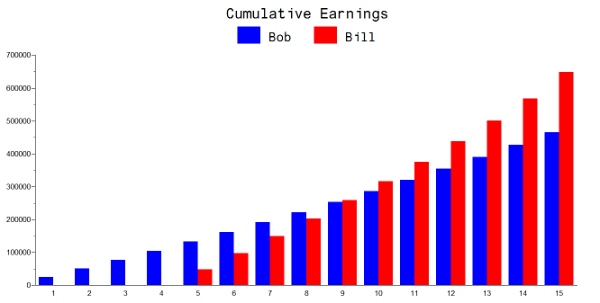
|
19A041 College, or Not? by Jim Davies, 10/8/2019
Take two young men aged 18, equally bright and diligent. Bill heads off for a four-year college course, while Bob gets a job immediately. Which does best? I assume zero inflation, such as will prevail in the coming zero government society, and that during their two careers each man earns an annual 3% increase in salary, by refining his skills and obtaining promotions. They each retire at 65. Bob's first job is rather menial, but management keeps an eye on him because he is bright and works hard. His wage is $12.50/hr or $25,000 a year, which rises over the 47 years of our comparison to $97,400 in the year he retires. Over his working life he earns a cumulative total of $2.51 million. Bill's case is more complicated. For the first four years he earns zilch, except for a valuable piece of parchment. Then he takes a job for $60,000 a year, for the HR manager of his firm values that parchment. The $60K is also increased, like Bob's, by 3% a year, as Bill earns promotions. However for his first ten years Bill has to pay off a "student loan" - the cost of his parchment - at $12,000 a year, so his available salary is that much less. In his final work year he earns $234,000 and cumulatively over the 47 years, $6.02 million - 2.4 times Bob's take. Now let's see how those cumulative earnings develop over time:  Notice that while Bill easily wins the race over the long term, his slow start and the student-loan burden mean that he gains advantage over Bob only after about 10 years, when each is aged 28. Still, if Bill can exercise patience and defer consumption, the case for attending college is, on these assumptions, rather strong. But now suppose we consider their respective sisters, Amanda and Amelia. They each wish to take part in the working world, but by age 30 each of them would like to do what Nature has best equipped them to do: raise a family. Now, the picture changes radically; at that age (12 years after each follows her brother's example) Amanda, who skipped college, has earned very little less than Amelia - who still has a couple of years' loan repayments to handle. So much for colleges and their costs the way they are today. How about some alternative, which may well surface in the coming ZGS? First, consider endowments. Colleges may revert to their well-tried traditional mode of providing excellent higher-ed for the most gifted students; and they will be financed largely by bequests in the wills of successful graduates. For example, Harvard today has an endowment of $38 billion, Yale of $29B, Princeton and Stanford each $26B, MIT $17B. Assuming a 10% investment yield, Yale could therefore afford to educate its 6,000 undergrad students without charging any fees at all, and still have more than $2.5B/yr left over to pay its professors and maintain its facilities. That's not a bad example, for use in the ZGS; in which most kids will exit their teen years with an education (from home, or a for-fee school) to rival that of the bachelors' degree issued by today's ho-hum colleges. Second, consider the duration of college courses: four years. Why so long? In the UK, it's normal to take only three years to earn a bachelor's degree. The extra year here no doubt boosts college revenues 33%, but also imposes that cost upon the student. One cause of it may be the abysmal performance of US high schools - freshmen may need their first college year to catch up. Another may be the great emphasis placed in the US upon team sports, and their financing; instead of trading on academic excellence, many colleges rely on performance on the football field. After E-day, I think there will be a big shake-out in "higher" education. Then third, that shakeout may even affect the Ivy League; Harvard, for example, has not recently shown itself to provide students with quite as "excellent" an education as my words above suggest. Bill Gates dropped out of it because he was already making so much money growing Microsoft and needed to work on that task full-time; the Chinese billionaire founder of Alibaba, Jack Ma, applied to the College ten times but was rejected, and Mark Zuckerberg invented Facebook in the teeth of petty interference by the college administration. In the coming ZGS, I expect a far more serious university emphasis on entrepreneurship. |
|
||||||||||||||||||||||||||||||||||||||||||










